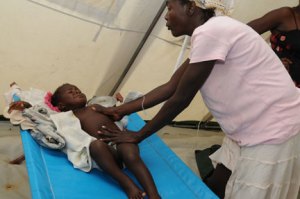
Marie Maude Pierre provides a cup of water for her 19-month-old daughter Daphta at the Cholera Treatment Center (CTC) in Mirebalias. Pierre said after just a few hours of receiving IV fluids Daphta already seemed to feel better. Project Medishare, in partnership with Partners in Health, is operating the CTC which has already treated over 10,000 patients since November. Photo by Jennifer Browning.
By Jennifer Browning
Marie Maude Pierre arrived at the Cholera Treatment Center (CTC) in Mirebalias at 2 a.m. on a Thursday with her 19 month old daugher, Daphta.
Pierre said Daphta’s diarrhea started Wednesday morning, but seemed to get better during the day after she coerced her daughter to drink the Oral Rehydration Solution (ORS) she had for emergencies just like this.
“At first I wasn’t really worried because I had ORS at home, so I mixed it with treated water,” Pierre said. “She wouldn’t drink it at first, but I finally got her to drink it.”
But during the evening, Daphta refused to drink the ORS and her symptoms worsened so Pierre, who lives in Grand Boucon, began the long walk to the CTC in Mirebalais so Daphta could receive treatment.

Aciane Devoinsin tries to comfort 2-year-old Yusmie. Devoinsin took a two hour journey in the middle of the night to get her daughter to the CTC from her village of Sarazin, near Las Cahobas. Photo by Jennifer Browning.
Pierre learned about cholera back in October. While shopping at the market, she received a text message on her phone from Digicel telling her there was a cholera outbreak along the Artibonite nearby. The text also explained what cholera was and what needed to be done to prevent and treat it.
“When I came home from the market, everyone was talking about cholera and how it was spreading very quickly and that a lot of people were infected already.”
After talking to people in the community, Pierre’s husband heard health agents were distributing aqua tabs and ORS nearby in Saut d’Eau.
After receiving treatment for over ten hours Daphta is already showing signs of progress.
“When we got here, they gave her the IV and now she is already looking better,” Pierre said. “Now she is willing to sit up and she is even smiling.”
When Aciane Devoinsin returned from the market, her older daughter told her that 2-year old Yusmie had diarrhea, by the middle of the night the vomiting began.

CTC staff spray their shoes with a high concentrated bleach solution to help avoid further spread of cholera. Photo by Jennifer Browning.
“I could tell that she was very tired and I worried that she wasn’t able to keep any fluids down,” Devoinsin said. “So I found a ride to come here.”
Even though Mirebalais is the closest CTC, it took Devoinsin two hours to get her daughter to the CTC from her village of Sarazin, near Las Cahobas.
“When we arrived the doctors put the IV in immediately. Yusmie was so weak when we got here, but now I can tell she is feeling better,” she said. “She wanted to play this morning. I am happy that at least my daughter is starting to feel better, and I am so thankful that there are people here who can help her.”
Both women said that they are taking precautions at home to treat all of the water before they use it for drinking or cooking, but it is difficult when a toddler is involved.
“I try to watch her and keep her hands clean,” Devoinsin said. “But she plays on the dirt floor, on the ground and I can’t carry her all day. I still continue to use the aqua tabs that were given to our family and everyone else has stayed healthy.”
Looking inside the acute care tent at the CTC operated in partnership by Project Medishare and Partners in Health, one might think that cholera is no longer an issue in Haiti. Mirebalais CTC administrator Almeus Techelet said until December the CTC was completely full.
“We had to double our capacity in order to treat everyone who came through the door,” Techelet said. “In January the flow of patients has lowered, and while we have less patients, we still have several people arrive each day with cholera.”
Techelet says the decrease in patients is due to education and prevention campaigns that were launched when cholera was discovered in October.
“People are more cautious now and they have learned to how to prevent getting cholera,” Techelet said. “This is why the patient flow has gone down. People now are taking more precautions about the water they use and drink, what they eat. They are more careful about preparing their food and also washing their hands.”
Dr. David Walton, the deputy chief of missions for Partners in Health, said the decreasing number of patients seen at the Mirebalais CTC is deceiving.
“It’s tricky because if you look right here at this cholera treatment center you would be deceived to think that cholera is getting better, but if you take a look at the places in the south there are reports of hundreds of people dying in the mountain sides and even in other cholera treatment centers and cholera treatment units,” Dr. Walton said. “This being one of the places where the epidemic started, we have sort of stabilized, but in many parts of the country they are just hitting that peak of cholera ravaging the countryside.”
In addition to more people following precautions, Dr. Walton said today more people are catching the disease earlier, which makes it easier for doctors to treat.
“Another thing we are seeing is a lot of people are coming earlier in the disease, so they get a little diarrhea and upset stomach and they get here well before they have the chance to develop severe cholera and severe dehydration,” he said. “So we are seeing people not necessarily in shock but a little bit earlier, which is good because it helps us resuscitate them. “
Dr. Walton explained that cholera hit St. Marc and Mirebalais the hardest first, so now these two places are stabilizing. And while the results at Mirebalais are positive, he said that doesn’t mean cholera is over in Haiti.
“It has been positive. You look at places like here…people live up there in the tops of those mountains. People live all over in there. You can’t see their houses from here but they are up there. How do you get the message to people up there? You have to get out, get to them and get the message to the people,” he said. “I think it has been really positive, but it’s only as effective as our ability to get those tools to the people.”
(more…)




